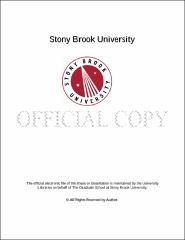| dc.identifier.uri | http://hdl.handle.net/11401/77507 | |
| dc.description.sponsorship | This work is sponsored by the Stony Brook University Graduate School in compliance with the requirements for completion of degree. | en_US |
| dc.format | Monograph | |
| dc.format.medium | Electronic Resource | en_US |
| dc.language.iso | en_US | |
| dc.publisher | The Graduate School, Stony Brook University: Stony Brook, NY. | |
| dc.type | Dissertation | |
| dcterms.abstract | This work proposes a critical vocabulary for the study of American historical literature and Native American literature in the light of the genocide of Native America. Considering this genocide in terms of trauma theory (including perpetrator trauma) and relationality theory, it becomes clear that a “working-through†for the non-native postgenerations who have unintentionally inherited stolen lands (along with a self/other construction of non-Native and Native Americans) is ethically and socially desirable. In transcending the dominant self/other paradigm, one’s orientation to US American and Native American historical literature is not about possessing knowledge of these histories and literatures, but rather knowing them in the relational sense, in terms of one’s holistic relation to them in the present. The “white Indian,†a historical or literary figure who has inhabited both EuroAmerican and Native society either symbolically or in reality, is a helpful point of focus in the study of both relational intersubjectivity and narrative strategies used to encourage the forgetting of genocide. Narratives by and about “white Indians†from the seventeenth century up until today can represent and perform various forms and degrees of relationality; they can also represent and perform the forgetting or justification of Native American genocide. Teaching these texts not as “dead letters†but as living messages deserving of an ethical and social response can encourage the working-through necessary to achieve more of a healing intercultural intersubjectivity. | |
| dcterms.available | 2017-09-20T16:52:50Z | |
| dcterms.contributor | Newman, Andrew | en_US |
| dcterms.contributor | Kaplan, E. Ann | en_US |
| dcterms.contributor | Welburn, Ron. | en_US |
| dcterms.contributor | Scheckel, Susan | en_US |
| dcterms.creator | Hankinson, Kathleen | |
| dcterms.dateAccepted | 2017-09-20T16:52:50Z | |
| dcterms.dateSubmitted | 2017-09-20T16:52:50Z | |
| dcterms.description | Department of English | en_US |
| dcterms.extent | 186 pg. | en_US |
| dcterms.format | Application/PDF | en_US |
| dcterms.format | Monograph | |
| dcterms.identifier | http://hdl.handle.net/11401/77507 | |
| dcterms.issued | 2016-12-01 | |
| dcterms.language | en_US | |
| dcterms.provenance | Made available in DSpace on 2017-09-20T16:52:50Z (GMT). No. of bitstreams: 1
Hankinson_grad.sunysb_0771E_12718.pdf: 1040090 bytes, checksum: 3078a2710dc8e7b31e83d70646223d5a (MD5)
Previous issue date: 1 | en |
| dcterms.publisher | The Graduate School, Stony Brook University: Stony Brook, NY. | |
| dcterms.subject | American historical literature, Early American Literature, Genocide, Native American Literature, Relationality theory, Trauma theory | |
| dcterms.subject | American literature -- Native American studies | |
| dcterms.title | WILLFUL FORGETTING: “WHITE INDIANS,†TRAUMA, AND RELATIONALITY IN AMERICAN HISTORICAL LITERATURE | |
| dcterms.type | Dissertation | |

